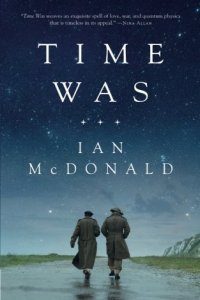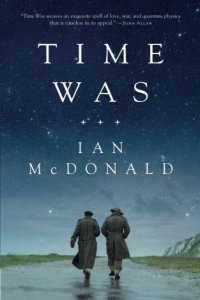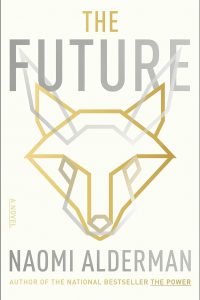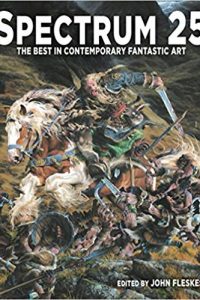Gary K. Wolfe Reviews Time Was by Ian McDonald
 Time Was, Ian McDonald (Tor.com 978-0-7653-9146-9, $14.99, 144pp, tp) April 2018.
Time Was, Ian McDonald (Tor.com 978-0-7653-9146-9, $14.99, 144pp, tp) April 2018.
Throughout his career, Ian McDonald has demonstrated a remarkable versatility of style and language. His recent fiction has ranged from the YA sense-of-wonder exuberance of his parallel-world Everness series to the efficient social melodrama narration of the Luna novels, but he’s always been equally capable of great lyricism, and his new novella, Time Was, is a persuasive and gorgeous example of it. Essentially a timeslip romance in which the romance is evoked not by dramatic clinches but by a heightened sensuality, an acute awareness of nature, and a haunting sense of imminent loss, it nevertheless introduces enough chatter about quantum indeterminacy to work as SF. In a fascinating way, the two “time-crossed lovers,” Ben and Tom, come to represent the dual aesthetic of any good SF romance: Ben is a physicist working on a complex new experiment with his “Uncertainty Squad,” while Tom is a poet and part-time amateur actor who, when we meet him, is working for the Signal Corps. Early on, Ben confesses that he doesn’t have the soul of a poet, and Tom admits he doesn’t “have the soul of a scientist,” but, as McDonald well knows, you need both to tell a story like this.
The manner in which he tells it is equally fascinating. Initially, we meet these lovers mostly through letters, occasional photographs, and bits of Tom’s own narration. The main narrator is an antiquarian bookseller who finds an ancient love letter from Tom to Ben in a copy of an anonymous poetry collection called Time Was. Trying to find clues through a shot-in-the-dark Facebook post, he is contacted by a woman named Thorn, living in the Fens of Lincolnshire, who has an entire archive inherited from her great-grandfather. When they show some of the photos to an Imperial War Museum archivist with a literally photographic memory, the mystery deepens: not only do Ben and Tom show up in photos from the First World War, they also appear in WWII photos taken 24 years later – barely aged – and even in a much later documentary film of the 1990s Bosnian War. Are they immortals, or time travelers, or even – as one lame suggestion has it – alien abductees? Complicating matters further is a report that they disappeared into a mysterious lightning-cloud – which itself had been sighted in other times and places.
There’s nothing strikingly original in the SF ideas McDonald presents here, which carry such an X-Files vibe that one of the characters even mentions it, but that’s not really the point. The mechanism by which these two time-unstuck lovers plot to keep in touch, involving a continent-wide network of used bookstores, is both ingenious and romantic in its own way – such bookstores, after all, have historically been among the most stable, unchanging business locations – at least until what the narrator calls our post-literate society. There is a rather surprising and effective twist toward the end of the tale that gives it an added dimension, but long before that it’s a paean to book-collecting detective work, to timeslip traditions of SF, and to the lyrical gay romance at its center (although McDonald pays relatively little attention to the difficulties Ben and Tom must have faced in keeping their relationship secret during a less tolerant era). Mostly, though, it’s one of the most purely beautiful pieces of writing McDonald has given us in years.
Gary K. Wolfe is Emeritus Professor of Humanities at Roosevelt University and a reviewer for Locus magazine since 1991. His reviews have been collected in Soundings (BSFA Award 2006; Hugo nominee), Bearings (Hugo nominee 2011), and Sightings (2011), and his Evaporating Genres: Essays on Fantastic Literature (Wesleyan) received the Locus Award in 2012. Earlier books include The Known and the Unknown: The Iconography of Science Fiction (Eaton Award, 1981), Harlan Ellison: The Edge of Forever (with Ellen Weil, 2002), and David Lindsay (1982). For the Library of America, he edited American Science Fiction: Nine Classic Novels of the 1950s in 2012, with a similar set for the 1960s forthcoming. He has received the Pilgrim Award from the Science Fiction Research Association, the Distinguished Scholarship Award from the International Association for the Fantastic in the Arts, and a Special World Fantasy Award for criticism. His 24-lecture series How Great Science Fiction Works appeared from The Great Courses in 2016. He has received six Hugo nominations, two for his reviews collections and four for The Coode Street Podcast, which he has co-hosted with Jonathan Strahan for more than 300 episodes. He lives in Chicago.
This review and more like it in the May 2018 issue of Locus.
 While you are here, please take a moment to support Locus with a one-time or recurring donation. We rely on reader donations to keep the magazine and site going, and would like to keep the site paywall free, but WE NEED YOUR FINANCIAL SUPPORT to continue quality coverage of the science fiction and fantasy field.
While you are here, please take a moment to support Locus with a one-time or recurring donation. We rely on reader donations to keep the magazine and site going, and would like to keep the site paywall free, but WE NEED YOUR FINANCIAL SUPPORT to continue quality coverage of the science fiction and fantasy field.







